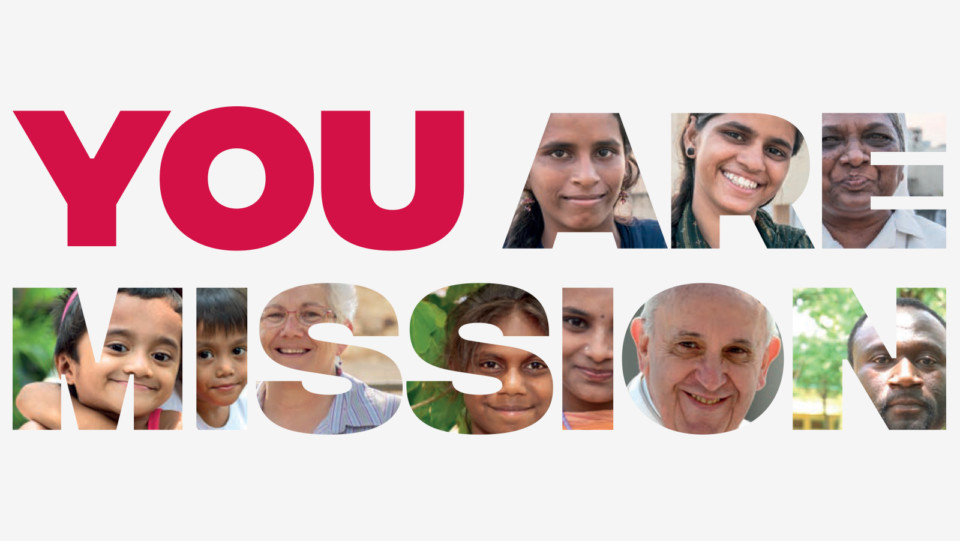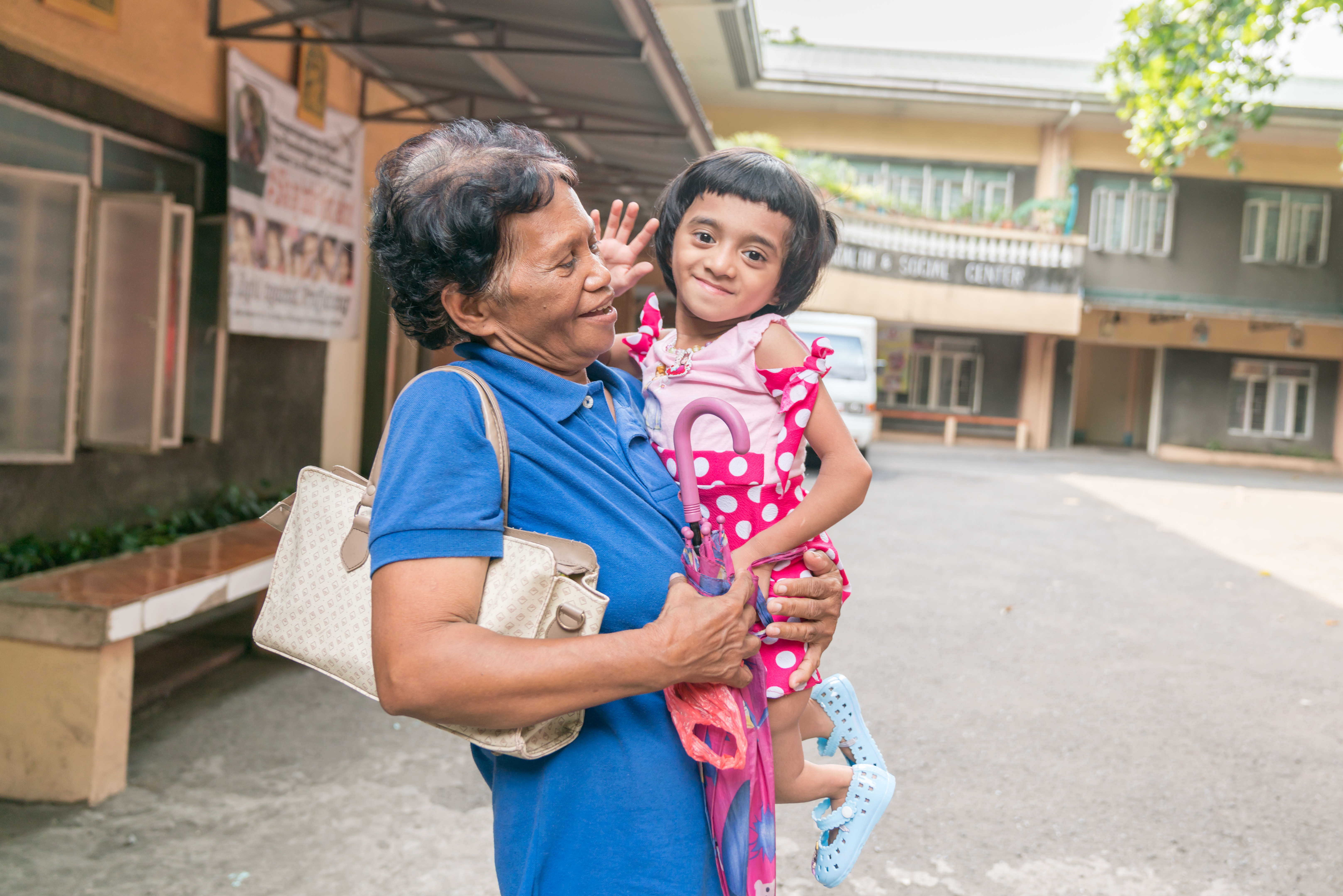
Work with Communities
World Mission Appel - Dignity in every child

A vision statement is proudly hung on a wall inside the Canossa Health and Social Centre in Tondo, a bustling bayside urban dwelling in Manila.
Heide carefully steps through the entry gate of theCanossa Health and Social Centre on Jacinto Street in Tondo. Looking left and right, her eyes search for one of the Canossian Sisters who works at the centre or simply a place to rest her legs, having walked two kilometres with a bag over one shoulder and a small child on the opposite hip. Finding the seat first, she carefully places seven-year-old Bridget down, conscious that the smallest mistake could break several bones in the girl’s tiny body.
This was the situation for Heide and Bridget just two years ago. Bridget suffers from osteogenesis imperfecta, more commonly known as brittle bone syndrome, and has endured dozens of fractures in her young life. Her arms, legs and spine are misshapen as a result, and she cannot support own weight; instead she relied on her grandmother to carry her from place to place. In addition to caring for Bridget full-time, Heide had her own health concerns to address, and with a house and Bridget’s younger brother Daniel to watch out for as well, she needed to work in the local market to earn an income. Life was an overwhelming struggle for both Bridget and Heide.
But thanks to your generosity in responding to their story through Catholic Mission, life has improved a great deal for the family. The one thing Heide most wanted was some independence for her little granddaughter. Through the support of Catholic Mission, a wheelchair was purchased for Bridget, which has made a significant difference in her life and in Heide’s.
‘Their life is better in some way because Bridget is no longer a burden, thanks to the wheelchair,’ says Sister Regina. ‘Heide would carry her everywhere back and forth, which would impact her ability to earn. Now Bridget does not need constant attention because she has more access thanks to the wheelchair.’
Heide says the wheelchair has improved her life, especially at home where it is most useful. ‘It has made my life at home much easier,’ she says. ‘It is easier to move her around.’
It is a step on a long road towards the young girl’s independence. ‘My happiest dream is for Bridget to walk,’ says Heide. ‘Because I am old now, I am 68 years old, and I pray that one day Bridget will walk.’
Heide says Bridget never lets her condition bring her down, but even she herself wonders if she will ever be like the other children. ‘She is happy; very, very happy. But she says to me, “When can I walk?”’
The next step is for Bridget to undergo some physiotherapy and, eventually, surgery. ‘They are now studying the skeletal structure of Bridget and the doctor will repair all of her bones,’ Heide says with an optimistic chuckle. Then, looking over the small body sitting restlessly in her lap, she sadly repeats, ‘All of her bones.’
Despite the hurdles ahead of Bridget and Heide, both feel positive about her prospects of one day leading an independent life. The Canossian Sisters have laid a strong foundation for this outcome, through their support of Bridget and the family over the years, which they will continue through the course of her treatment.
The biggest achievement in that time has been Bridget’s integration into school, made far more accessible by the wheelchair, where she is enjoying herself and earning achievement awards. ‘Bridget is very interested in her study,’ says Heide. ‘When she does not go to school she is crying, saying, “I want to study!” Even in the storm, in the rain, she wants to be at school.’
Bridget is but one example of the many people, young and old, in the Tondo community who have been supported by the Sisters. Because of its location and high population density, Tondo has one of the highest rates of tuberculosis in the entire region. The Canossa Centre has a well-established tuberculosis treatment and prevention program, including a DOTS (Directly Observed Treatment Short course) clinic and a regular feeding program. They focus strongly on combating malnutrition in the local area, as this is a leading precursor to tuberculosis. In addition, the centre runs a dental clinic, pharmacy, and general practice, which sees volunteer doctors from the local hospitals give their time to administer anything from vaccinations to circumcisions.
With all of these programs aiming to help the local people, the Sisters, in accordance with their stated vision, have empowerment always front of mind. ‘We provide certain assistance for them as well if they cannot pay for the medicines,’ says Sister Regina. ‘We work out a plan for them to pay in instalments when they can. But we ensure that they are not dependent on this assistance. Just because they are poor does not necessarily mean they cannot afford to pay; if they can afford vices, it means they can afford the treatment. They have to bring up their dignity as poor people.’
In this regard, the Sisters also introduced small micro-financing initiatives to promote economic responsibility and to build capacity. ‘That’s why we also offer some assistance for their income generating projects, some of our patients borrow money to start their own business. These projects might be tailoring, or selling food.’
Some get an extra leg-up. ‘We gave two sisters some mangoes to sell. One of them came back later, wanting to return the money they had made from the sale of the mangoes, but we said no that is your money now and she used part of it to buy footwear for her sister and the other part she used for food.’
With plenty of other hospitals in the nearby areas, there is no shortage of alternative places where locals can seek treatment. However, they come in their droves to the Canossa Health and Social Centre because it offers something beyond simply practical treatment.
‘The patients come here for more complete service,’ says Sister Regina. ‘The government cannot provide a more integrated program; some are just about providing medicines. Ours is a holistic approach and our services are more accessible and available to the local people.
‘We also offer morning prayer, religious education and catechesis.’ When asked if the spiritual element of their work is what attracts people, Sister Regina is affirming. ‘Maybe that is why they come here instead of somewhere else. Our services like feeding, material needs, and medications are just means, just instruments for the people to know and love God, to appreciate the goodness of God even in these things. They have to know certain things about their lives as God’s children, how they have to appreciate the things that are blessings for them.’
Your support of the Canossa Health and Social Centre over the years through Catholic Mission’s work with children has ensured the Sisters can continue to provide this vital service for the Tondo community. Father Zaldy Camposo has seen the benefit of the Centre for the community over his four years in Tondo. ‘The Canossa Centre has accommodated the people of this community who are most in need,’ he says. ‘Sadly, it cannot accommodate all, and that is why we need support. We must communicate with the people, engage with them, and make them feel loved by God.’
Sister Regina is grateful for the support of Australians towards achieving their vision. ‘We would of course like to thank you for the continuous assistance, because you have supported us in areas in which other agencies do not. If we have the support of just one, we cannot continue, but your support is a big help.’
For Bridget, the dignity afforded to her simply through increased mobility is a life-changing blessing. With a tear in her eye, Heide remains dedicated to her grandchild. ‘For the rest of my life I will do my best to help Bridget.’